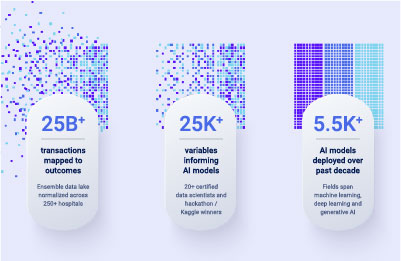What you need to know: Artificial intelligence (AI) holds great opportunity for the healthcare revenue cycle, and organizations are taking notice. One recent survey found that nearly 60% of healthcare organizations are considering using generative AI for revenue cycle management (RCM) operations. AI models can be fine-tuned to reduce friction across the revenue cycle and more accurately predict outcomes. For patients and staff, AI can help automate tasks, enhance accuracy and promote compliance.
The healthcare revenue cycle offers a labyrinth of processes, each with its own intricacies. Coding complexities, billing inaccuracies, claim denials and reimbursement delays can often create bottlenecks. These inefficiencies not only impact financial health but also directly affect patient care, causing delays and frustrations in the healthcare journey.
Optimizing the healthcare revenue cycle with AI
Luckily, artificial intelligence can lend support in these areas by:
- Automating administrative tasks: AI-driven solutions streamline coding and billing processes, significantly reducing manual efforts and error rates. By automating these tasks, institutions can expedite the revenue cycle and minimize discrepancies.
- Enhancing accuracy in claims processing: AI’s analytical capabilities can help minimize errors in claims processing, reducing denials and rework. This precision ensures smoother revenue flow and quicker reimbursements.
- Optimizing revenue with predictive analytics: AI algorithms can analyze historical data to predict and prevent barriers to efficient, complete revenue collection. This proactive approach aids in strategic planning and resource allocation, ensuring optimal financial outcomes.
- Engaging patients with AI-driven communications: By leveraging AI-powered platforms, institutions can provide patients with transparent billing information and promote compliance. This not only fosters trust but also reduces payment delays.
Here at Ensemble Health Partners, AI is deployed in ways both big and small in support of our partners. The Ensemble data lake maps over 25 billion transactions to outcomes, providing a continuous and growing stream of feedback and insights across our partners. Over the past decade, more than 5,500 AI models have been deployed, informed by 25,000+ variables.
This enables our partners to benefit from things like predictive analytics, intelligent prioritization of operator work queues and zero-touch automation to streamline processes and ensure providers get paid what they are owed.
A bright future for AI in healthcare RCM
The healthcare revenue cycle, which encompasses the entire lifespan of a patient’s account from appointment scheduling to payment, is a critical process for any organization. Artificial intelligence and generative AI stand to revolutionize not just healthcare’s clinical processes but also those of revenue cycle management.
Today’s AI innovations have the potential to address longstanding challenges and optimize RCM operations — if deployed thoughtfully and with consideration for the current limitations of this technology.
Having specific elements in place can help support AI transformation. These include:
- Using aggregated, normalized data to build and train models
- Building diverse models representing numerous geographies and perspectives, which can prevent overfitting a model to a limited set of instances
- Deploying a clear correlation of inputs to outputs — in the revenue cycle, this might be transactions mapped to outcomes — in order to detect successful patterns
- Smoothly integrating AI into RCM operations in order to infuse insights directly into workflows and streamline processes
- Ensuring compliance with HIPAA and other security or privacy policies
Due to specialized knowledge, massive processing power and particular tools needed, building AI models and implementing them effectively can be a difficult undertaking for providers attempting to implement on their own. The right end-to-end RCM partner with experience incorporating AI into the revenue cycle can help to make the transition a seamless one.
The bottom line
AI’s integration into the healthcare revenue cycle brings with it the ability to automate tasks, enhance accuracy, provide predictive insights and engage patients. Exploring and strategically adopting AI solutions can redefine the financial landscape of healthcare institutions, paving the way for improved efficiency, accuracy and, most importantly, better patient outcomes.
Explore The Power + Potential of AI in the Healthcare Revenue Cycle to find out more about how artificial intelligence is being applied in RCM today and learn additional best practices for implementation. Get the whitepaper >>>


